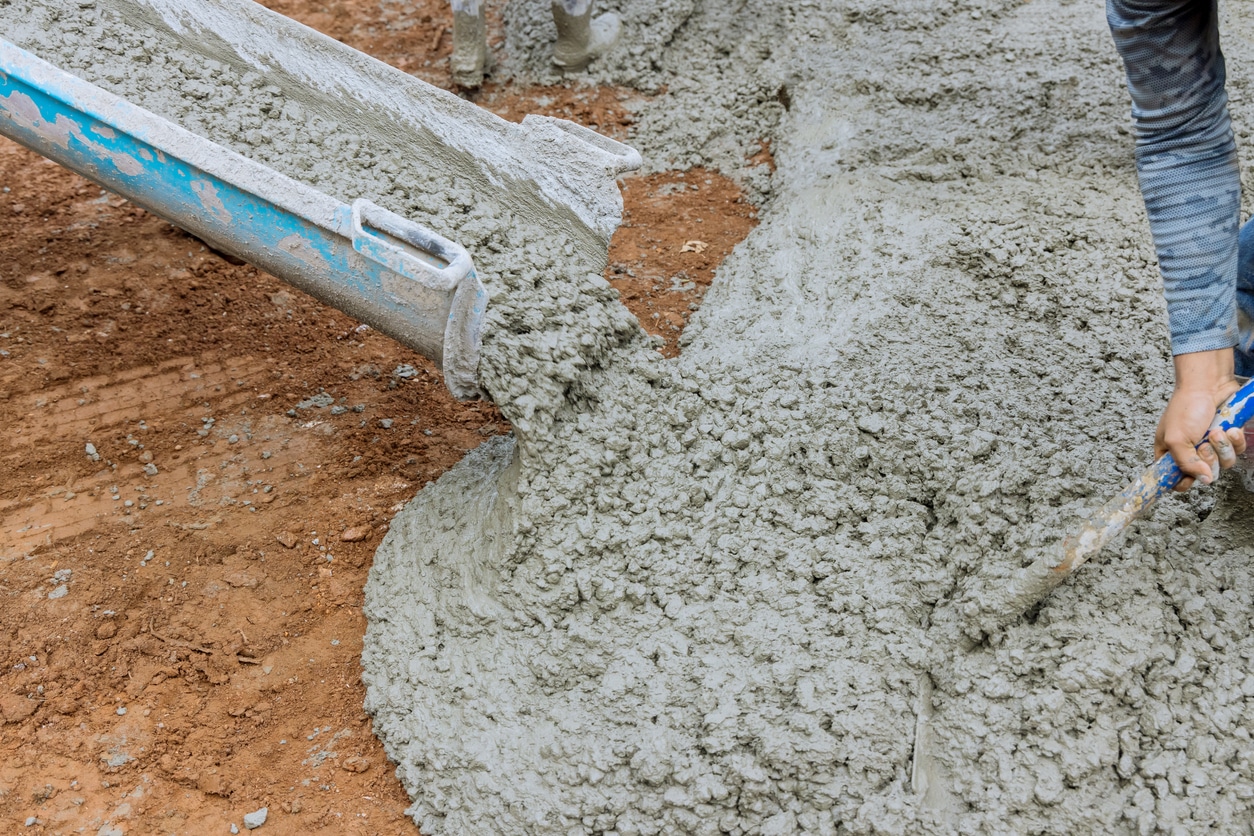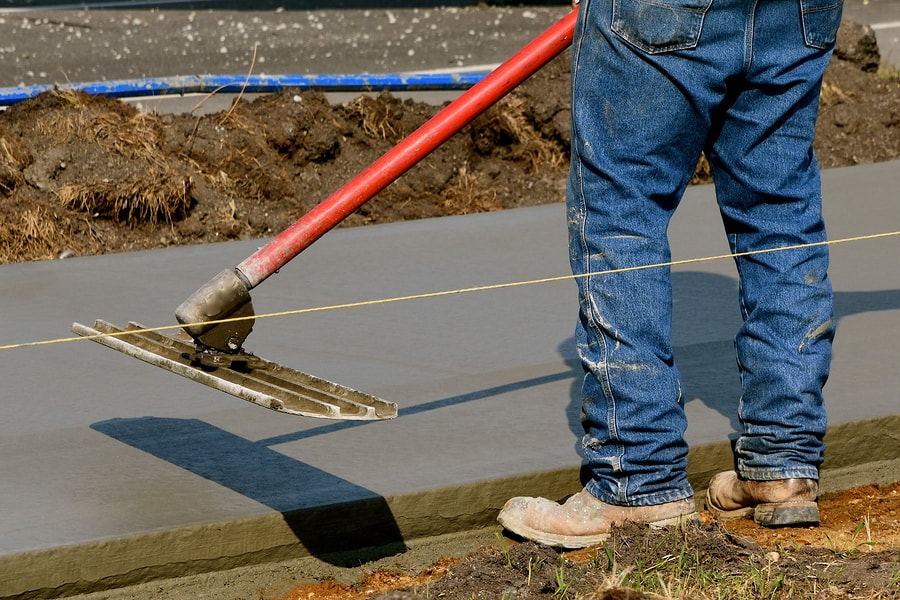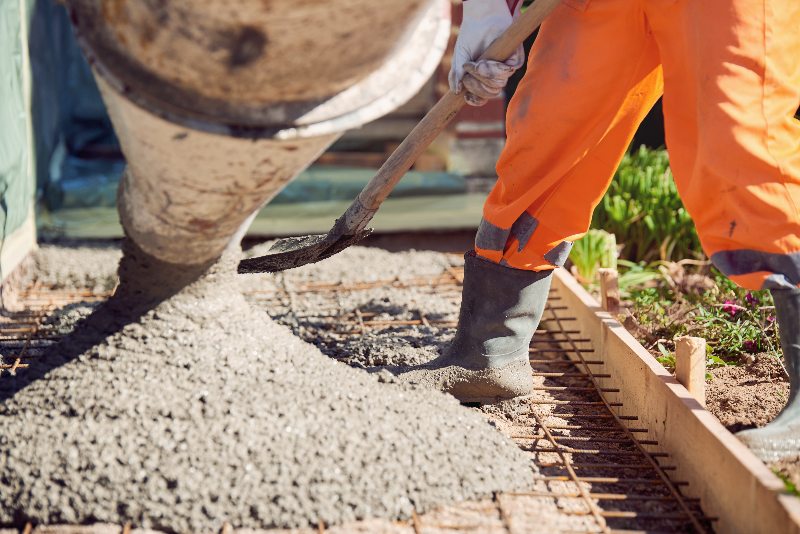Find out how TJ Concrete Contractor delivers exceptional results every time

Comprehending the Important Role of a Concrete Contractor in Modern Building and Layout
Concrete specialists are vital to the building and construction and layout markets. Their competence assurances that frameworks are not just sturdy yet also cosmetically pleasing. They take part in numerous duties, from task intending to top quality control, and collaborate with designers and architects. With developing modern technologies and trends, their role is extra crucial than ever before. Understanding their impact can reveal understandings right into modern-day construction methods and the future of structure design.
The Value of Concrete in Building and construction
Various products are utilized in building, concrete continues to be a cornerstone of modern-day structure practices due to its versatility, resilience, and strength. This composite product, made from concrete, water, and accumulations, can hold up against significant anxiety and is resistant to fire, weather condition, and pests, making it suitable for diverse applications. Concrete's adaptability permits it to be formed right into various forms and sizes, promoting cutting-edge building layouts.
Furthermore, its thermal mass buildings add to power performance, aiding to control interior temperatures. The widespread accessibility of resources and the reasonably reduced price of concrete also improve its charm for massive jobs, from industrial structures to infrastructure like bridges and roads. As urbanization continues to rise, the need for lasting and trustworthy building materials solidifies concrete's essential role in construction, making it a fundamental choice for designers and contractors going for long life and strength in their jobs.
Trick Duties of a Concrete Contractor
Concrete service providers play a necessary function in the building and construction process, with a number of crucial responsibilities that ensure project success. Their jobs consist of task planning and style, material choice and administration, along with preserving quality assurance and assurance throughout the task lifecycle. Recognizing these duties is important for appreciating the specialist's influence on construction results.
Job Preparation and Layout
When beginning on a building job, reliable task planning and style play a crucial duty in a concrete professional's duties. The professional must team up carefully with customers, engineers, and architects to recognize the task's specs and objectives. This entails reviewing website conditions, examining design needs, and determining the scope of work. A concrete contractor is also responsible for developing timelines and budgets, guaranteeing that all stages of the task line up with overall purposes. In addition, they should expect potential challenges and develop options to preserve task efficiency. By thoroughly planning and making each element of the concrete job, the specialist establishes the foundation for effective implementation, ensuring structural integrity and adherence to safety standards throughout the construction process.
Product Choice and Monitoring
Reliable material choice and administration are vital responsibilities for a concrete specialist, as these decisions straight influence the quality and durability of the last framework. Concrete professionals should assess various products, consisting of accumulations, admixtures, and reinforcement types, to ensure they fulfill project specifications and environmental problems. They need to think about aspects such as workability, strength, and resistance to weathering. Furthermore, taking care of the supply chain is essential, as prompt shipment of products can remarkably affect job timelines. Professionals should keep relationships with vendors to protect high-quality sources while also monitoring inventory degrees to avoid extras or scarcities. Eventually, this mindful choice and management of products add to the general success of construction projects and the longevity of the frameworks built.
Quality Assurance and Guarantee
Quality control and guarantee are paramount in the construction market, specifically for concrete contractors tasked with supplying dependable and resilient structures. Concrete service providers have to carry out extensive quality assurance steps throughout the construction procedure, ensuring that all materials meet specified policies and criteria (TJ Concrete Contractor). This includes monitoring the blending, pouring, and healing procedures to stop issues and improve architectural integrity. Normal inspections are important, enabling service providers to identify and remedy issues quickly. Furthermore, concrete service providers frequently work together with architects and designers to assure that the final item straightens with style specs. By adhering to strict quality assurance procedures, concrete professionals not just guard the durability of their work yet also support the depend on of clients and stakeholders in the construction market
Kinds of Projects Taken Care Of by Concrete Professionals
Although concrete contractors are typically connected with massive building and construction tasks, their competence includes a diverse series of applications. These professionals are essential to domestic tasks, such as driveways, patio areas, and foundations, guaranteeing durability and aesthetic charm. In industrial construction, they add to the creation of floorings, walkways, and architectural elements that satisfy particular layout and security requirements.
Concrete contractors are involved in framework jobs, consisting of roads, bridges, and passages, where their skills assure structural stability and longevity. They also play an essential role in ornamental concrete applications, such as stamped concrete and sleek surfaces, which improve the visual aspect of different rooms. Additionally, their services reach repair and maintenance work, dealing with issues like breaking or disintegration in existing frameworks. This convenience highlights the essential role concrete contractors play in both ornamental and useful aspects of modern construction and layout.
Qualifications and abilities Needed
Concrete professionals must have a varied set of certifications and skills to properly take care of the variety of jobs they carry out. Proficiency in concrete mixing, putting, and finishing is important, as is a solid understanding of numerous kinds of concrete, including strengthened and decorative choices. Knowledge of building and construction strategies, blueprints, and project management principles is crucial for successful execution.
Physical stamina and strength are important due to the requiring nature of the work. Professionals must additionally have strong analytic capabilities to deal with unexpected difficulties throughout projects. Communication abilities are important for coordinating with clients, designers, and various other tradespeople.
Additionally, getting pertinent qualifications can enhance a professional's credibility and broaden their job opportunities. Continuous education and learning in brand-new methods and materials keeps specialists competitive in a quickly evolving sector. These qualifications and skills jointly enable concrete service providers to supply high-quality results successfully and effectively.
The Function of Concrete Specialists in Safety And Security Conformity
Ensuring safety conformity is an essential responsibility of concrete service providers, as they browse the intricacies of building and construction sites. These specialists are charged with adhering to strict safety and security regulations and requirements, which are important for avoiding mishaps and making certain the health of all website workers. TJ Concrete Contractor. Concrete contractors must execute comprehensive security plans that include training personnel on correct tools usage and security methods
Furthermore, they are liable for inspecting products more info and job processes to determine potential risks. By carrying out normal safety audits and danger assessments, concrete professionals can proactively resolve problems prior to they escalate. In addition, they work together with various other building and construction professionals, such as designers and job supervisors, to integrate precaution right into the overall job strategy. Inevitably, the commitment of concrete professionals to safety compliance not only protects employees yet additionally enhances task efficiency and quality, enhancing their vital function in modern building.
Patterns and Developments in Concrete Style
Recent innovations in concrete design have actually presented an array of trends and developments that focus on sustainability and aesthetic appeals. Sustainable concrete solutions, decorative finishing methods, and smart concrete technologies are improving the industry. These developments not only improve architectural honesty however also add to environmentally accountable construction techniques.
Lasting Concrete Solutions
As the building market significantly focuses on sustainability, cutting-edge concrete services are arising to lower environmental impact while improving efficiency. One noticeable trend is using recycled materials, such as smashed concrete and commercial by-products, which not only lowers waste but additionally enhances the concrete's properties. Developments in admixtures, consisting of fly ash and slag, add to reduced carbon discharges during production. Another considerable development includes the growth of permeable concrete, which allows water to flow through and minimizes runoff, alleviating flooding and groundwater depletion. In addition, the surge of carbon capture technologies in concrete manufacturing holds assurance for additional emissions reduction. These lasting concrete options exemplify the industry's commitment to ecologically accountable building and construction techniques.

Attractive Finishing Methods
A wide variety of attractive completing strategies have arised in concrete layout, changing plain surfaces right into aesthetically striking components. Techniques such as stamping, staining, and polishing enable a broad array of visual opportunities, satisfying varied style choices. Stamped concrete mimics all-natural materials like rock and block, while tarnishing introduces dynamic colors that boost the surface area's charm. Refined concrete, recognized for its streamlined coating, includes class to both industrial and residential areas. Additionally, microtopping and overlay systems give cutting-edge alternatives for revitalizing existing concrete. These techniques not only enhance the visual qualities yet also improve sturdiness and maintenance. As fads evolve, the integration of ornamental surfaces proceeds to play a critical role in modern-day construction, marrying functionality with creative expression.

Smart Concrete Technologies
While conventional concrete continues to be a staple in building and construction, the development of clever concrete technologies is changing the market by integrating advanced features that improve performance and sustainability. These technologies include self-healing concrete, which utilizes ingrained microorganisms that turn on upon cracking, and sensor-equipped concrete that monitors structural health in real-time. Additionally, piezoelectric and thermochromic concrete can adjust to environmental changes and produce electrical energy, specifically. The implementation of recycled products and green additives likewise contributes to decreasing the carbon footprint of concrete production. As these technologies proceed to develop, they guarantee to boost durability, lower maintenance expenses, and promote greener building methods, making them critical for future construction projects. The duty of concrete contractors is significantly considerable in utilizing these developments.
Frequently Asked Inquiries
What Aspects Influence Concrete Rates in Construction Projects?
Concrete prices in building jobs is influenced by material prices, labor costs, project dimension, location, availability of sources, and market need. Seasonal variables and transportation costs can also greatly influence the overall rates framework.
Just How Do Climate Condition Impact Concrete Job?
Climate condition significantly influence concrete work; severe temperature levels, humidity, and rainfall can impact establishing times, treating procedures, and overall quality - Concrete Contractor Near Me. Contractors need to adjust their timetables and approaches to alleviate these ecological influences for effective project completion
What Is the Common Timeline for a Concrete Task?
A normal concrete job timeline varies from a couple of days to several weeks. Elements affecting this period include job size, complexity, weather, and treating times, which collectively establish the general completion timetable.
Can Concrete Contractors Aid With Layout Consultations?
Concrete contractors can indeed assist with design assessments, giving beneficial understandings on material selection, architectural honesty, and aesthetic options, making certain that tasks fulfill both practical needs and the customer's vision for the completed item.
What Are Usual Misconceptions Regarding Concrete Resilience?
Usual false impressions about concrete resilience include the idea that it is impervious to damage and that all types are just as solid. In truth, factors like mix layout, environmental conditions, and maintenance significantly influence concrete's lasting efficiency.
They likewise play a crucial duty in decorative concrete applications, such as stamped concrete and sleek surface areas, which enhance the aesthetic aspect of various areas. Effectiveness in concrete mixing, putting, and ending up is crucial, as is a solid understanding of various kinds of concrete, including strengthened and ornamental options. One prominent trend is the use of recycled materials, such as crushed concrete and industrial byproducts, which not just lowers waste but also enhances the concrete's homes. While traditional concrete remains a staple in building, the appearance of smart concrete innovations is changing the industry by integrating innovative functions that improve efficiency and sustainability. These innovations include self-healing concrete, which utilizes ingrained germs that turn on upon cracking, and sensor-equipped concrete that monitors structural health in real-time.